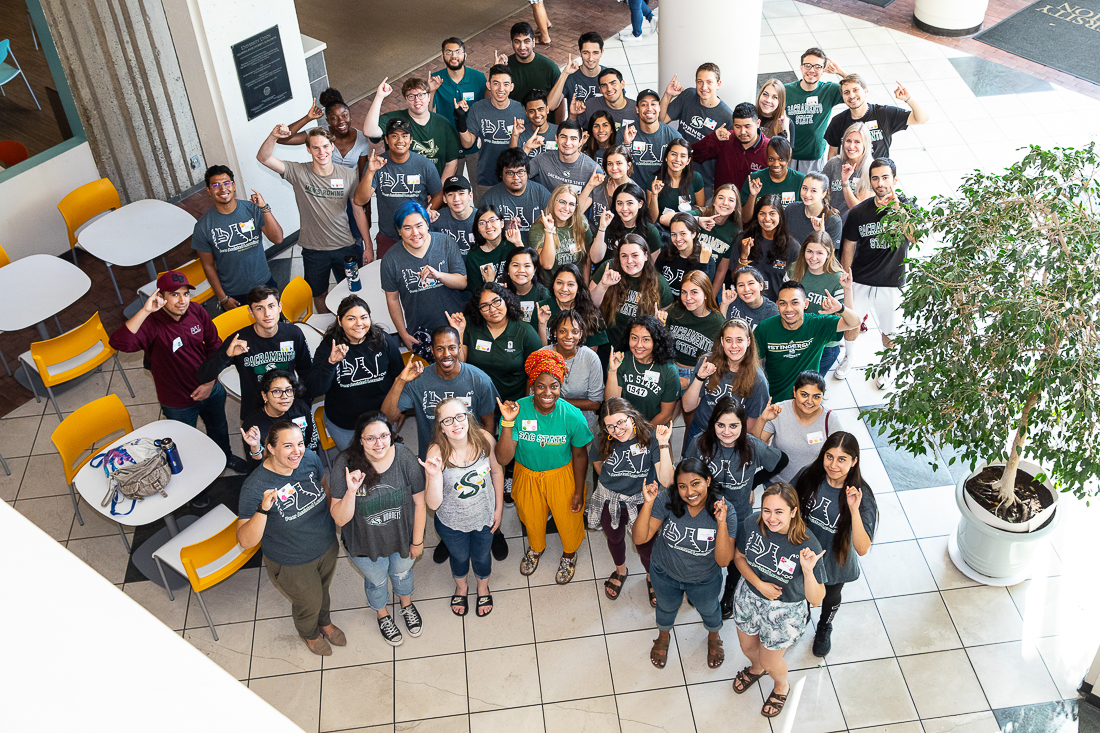
A five-year, $1.8 million National Science Foundation grant will help Sacramento State's STEM students learn crucial leadership skills while building bridges across campus to help more students graduate and pursue their chosen careers. (Sacramento State/Andrea Price)
By Cynthia Hubert and Dixie Reid
Developing the next generation of scientists and engineers requires more than teaching technical skills.
It’s also about building confidence, communication expertise and teamwork.
At Sacramento State, Peer-Assisted Learning (PAL) programs help students achieve such leadership skills while attaining their academic goals.
That work soon will be expanded, thanks to a $1.8 million award from the National Science Foundation.
The five-year grant will also strengthen bridges between the colleges of Natural Sciences and Mathematics (NSM), and Engineering and Computer Science (ECS) to help more students graduate and pursue their chosen careers.
“As future scientists and engineers, our students need similar professional skill sets: the ability to understand and effectively communicate technical information to diverse audiences,” said Civil Engineering Professor Julie Fogarty.
At Sac State and universities across the nation, professional skills tend to “take a back seat” to technical coursework, Fogarty said. Yet these skills can “make or break” the ability to obtain and maintain careers in science, technology, engineering and mathematics, or STEM, she said.
The federal grant will allow Sac State to launch a Peer-Assisted Learning program in ECS and create a leadership academy uniting science and engineering faculty and students.
Through its Center for Math and Science Success, NSM uses trained students, known as PAL facilitators, to gently guide scholars enrolled in gateway science courses through additional problem-solving sessions. Last year, facilitators received a small stipend to work on their leadership skills and design and develop projects that could have positive impacts on their peers.
Among those projects were a program that funds basic classroom tools such as goggles and calculators for science students, and a mental health support project for those struggling with stress, anxiety and other issues.
PAL employs 80 undergraduates each semester, said Biology Professor Jennifer Lundmark, who directs the program and is working with Fogarty and others on the collaborative student success effort.
“I’ve taken note of how dramatically and positively this job affects our facilitators’ personal confidence, communication skills and ability to lead and manage groups,” all of which are key skills for science professionals, Lundmark said. “Our students are Sacramento State’s greatest resource, and this project will provide them with more opportunities to develop into the STEM leaders that this state and our country desperately need.”
ECS has a Hornet Leadership program of its own that focuses on seminars, an annual conference and mentorship opportunities with area employers. Engineering and Computer Science students have worked as facilitators in the NSM PAL program.
With the federal grant, both colleges will be able to “develop a more robust leadership program that reaches students at every level,” said Fogarty.
Beginning in spring 2021 and over the next five years, every student in the colleges will benefit from the PAL program, she said. The Hornet Leadership Program will expand to include a real-world project for scholars in summer 2021 as well as seminars, workshops and a leadership development course in fall 2021.
Together the programs will help place students on successful career paths, said Fogarty.
“The PAL program pushes students to think more deeply and further develop their technical skills, leading to better comprehension and consequently better grades even for already high achievers,” she said. “Complementing those improved technical skills with excellent communication, self-initiative, and teamwork abilities through the STEM Leadership Academy will open more doors for our students as they go on to apply for advanced degrees or their dream jobs.”
The larger goal of the efforts, the professors said, is to increase academic performance, retain more students and decrease time to graduation. Evidence suggests that participation in leadership programs gives students more confidence in their abilities and can make them more likely to pursue a STEM career.
Ultimately, the professors said, they aim to increase the number of transfer students, women and under-represented minority scholars in STEM majors and careers, as well as to shrink opportunity gaps.
“We’re excited to provide more opportunities for our students to show off their skills and positively impact the Sacramento region,” said Fogarty.
